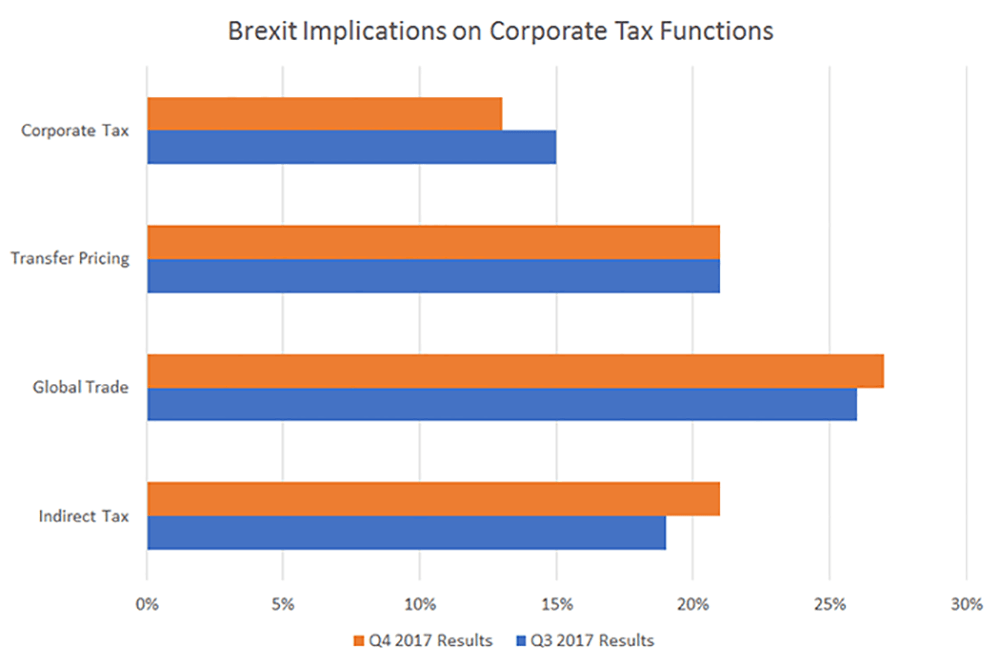Brexit Implications on Corporate Tax Functions

With only a year to go until Britain leaves the EU in March 2019, the next few months are increasingly focused on the transition into a post-Brexit landscape. At Thomson Reuters we have been running a quarterly CFO survey to understand the impacts of Brexit on various industries across the UK. The results indicate that the following tax functions are the most impacted following Britain’s decision to leave the EU: Indirect Tax, Transfer Pricing, Direct Tax and Global Trade. From this we have conducted deeper analysis to further understand what this means.

Indirect Tax
Depending on the terms of the trade agreement(s) the UK can secure with the rest of Europe post-March 2019, there may be implications on businesses both from a customs duty and indirect tax (VAT) perspective. Businesses are increasingly aware that Brexit will influence indirect tax functions. The survey shows this has moved from 19% to 21% in recent months.
At the end of January, the European Commission released a notice to stakeholders detailing the VAT and customs impact on the UK’s withdrawal from the European Union. In summary, the notice details the legal repercussions that private parties providing a service or trading goods will encounter post Brexit, given no transitional period is agreed upon.
A particular concern from an indirect tax perspective is that, depending on the terms of future trade agreements and the implementation of a transitional period, the UK may see the rate of duty rise. This would subsequently impact the total costs to the business. Additionally, EU-imposed statistical reporting and supplementary filings such as Intrastats and EC Sales List (for B2B supplies of goods and taxable services) will no longer be required. Brexit will likely impact the number of UK businesses needing to register and comply with foreign VAT rules and consequently, be affected by the speed of VAT recovery and cash flow.
Global Trade
Britain’s decision to leave the EU has significant implications on trade. Regardless of the terms of the agreements Britain secures with the rest of Europe, future trade legislation will affect all stakeholders involved in trade activity and the supply chain process to and from the UK.
The free trade that exists between the UK and its European neighbours (without the imposition of VAT or customs duties) will be likely lost. Following from this, it is therefore understandable that 42% of businesses regard trade as the biggest risk of Brexit; with an additional 27% of organisations believing that customs will be the tax function most impacted.
The ease of free trade enabled by EU membership is likely to be affected in a post-Brexit Britain. The industries highlighted to be most impacted by future changes in terms of trade are the retail, manufacturing and automotive sectors.
Transfer Pricing
From a legislative perspective, substantial changes are not anticipated for the UK’s transfer pricing rules. However, Brexit may have practical transfer pricing implications for UK businesses.
The survey results highlight that 21% of businesses think Brexit will affect their transfer pricing. If a business chooses to restructure, including moving assets or operations into or out of the UK, transfer pricing policies will likely need updating. The implications could include reviews of supply chain (including risk allocation and centralisation of high value functions) or IP holding jurisdiction, for example. With the survey results indicating that 9% of businesses are considering shifting headquarters out of the UK, and 24% anticipating relocating staff from the UK, there is a foreseeable practical impact on transfer pricing. Furthermore, negative effects on the UK economy may also prompt a change in transfer pricing policy and documentation, including exchange rate volatility and increased transaction costs.
Direct Tax
The UK exit from the EU would be unlikely to trigger a sudden change in UK direct tax policy. However, it would mean the UK is no longer subject to EU corporate tax directives and this may have practical implications.
The UK will be free to amend its direct tax legislation to create a more competitive environment. However, a substantial divergence from the EU system might make the UK less attractive to inward investors and reduce its leverage in negotiations with the EU. Also, the UK acts as a foreign direct investment gateway into the EU: it is estimated that half of EU headquarters of third party multinationals are based in the UK due to a number of favourable domestic tax rules, its extensive double tax treaty network and its EU status. Therefore, in light of Brexit, many investors will understandably wish to assess the tax impact of continuing to use a UK holding company structure.
Conclusion
Although building a concrete picture of a post-Brexit Britain remains difficult, the Thomson Reuters Quarterly CFO Brexit Surveys highlight some interesting results. Thomson Reuters is dedicated to understanding the implications of Brexit on the business community across the UK and Europe, and sharing that understanding with the market.